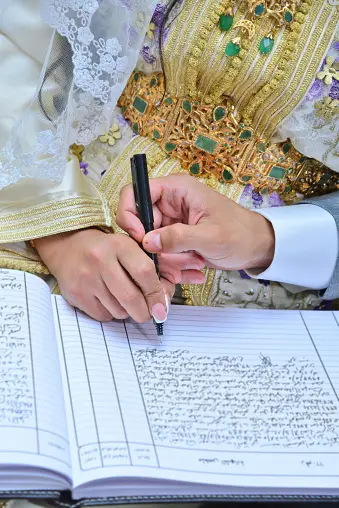Legal and Cultural Aspects
We delve into a sensitive yet important matter concerning marriage within certain Legal and Cultural Aspects. Specifically, we address the concept of Haq Meher, a fundamental aspect of marriage in various societies. This discussion aims to shed light on whether a man can marry his daughter or sister for dowry. We’ll also explore the rightful ownership and inheritance within the Haq Meher tradition.
Understanding Haq Meher
Haq Meher is a significant element in Islamic marriages, representing the financial rights and obligations of the groom towards the bride. It’s a mandatory stipulation, emphasizing the groom’s commitment to provide financial security to the bride. However, the issue at hand revolves around whether a man can marry his daughter or sister to acquire dowry.
The Haq Meher and Inheritance Rights
In the context of Haq Meher, the groom is obliged to give a certain amount of wealth or assets to the bride, as agreed upon mutually or by cultural norms. However, it is essential to clarify that Haq Meher is a right bestowed upon the bride, ensuring her financial security. This inheritance is separate from any potential dowry.
Addressing the Question
The question regarding a man marrying his daughter or sister for dowry requires a careful analysis of legal and ethical aspects.
Marrying for Dowry: Legal and Moral Implications
Marrying one’s daughter or sister purely for the purpose of acquiring dowry raises serious ethical and legal concerns. In many societies and legal systems, such actions are considered unethical, exploitative, and immoral. Laws and cultural norms emphasize the importance of protecting the rights and dignity of individuals, particularly vulnerable groups like women.
Shariah’s Perspective on Haq Meher
In Islam, Haq Meher is an obligatory component of a Muslim marriage. The Quran and Hadiths stress the significance of fulfilling this financial obligation towards the bride. However, it is crucial to emphasize that Haq Meher is not a means for exploitation but rather a symbol of the husband’s commitment to providing financial security to his wife.
Balancing Tradition and Ethics
While respecting traditions and cultural practices is important, it is equally vital to uphold ethical principles and ensure the dignity and well-being of individuals. Striking a balance between honoring cultural customs and adhering to ethical norms is a critical aspect of any society’s progress.
The issue of Haq Meher, particularly in the context of marrying one’s daughter or sister for dowry, underscores the need for a comprehensive understanding of legal, cultural, and ethical dimensions. It is imperative to ensure that customs and practices align with ethical guidelines and legal frameworks, prioritizing the rights and well-being of individuals within our societies. Through a thoughtful and informed approach, we can work towards a more just and respectful society.
Clarifying Misconceptions on Polygamy: An In-depth Analysis
Polygamy, a practice prevalent in Islam, is often misunderstood. In this blog post, we aim to clarify the legality and morality of polygamy. We’ll delve into Quranic verses and the Prophet’s teachings, presenting a comprehensive understanding of this subject.
Addressing a Common Misconception
Some misconstrue that a man can marry multiple wives only when he must support orphan girls and fears injustice among them. This misconception arises from a misinterpretation of a particular Quranic verse, which we aim to clarify.
Understanding the Misinterpreted Verse
The verse in question is found in the Quran, stating: “If you fear you won’t do justice to orphan girls, then marry women you like, two to three to four. From four.”
The Legal and Moral Aspects of Polygamy
Polygamy is a permissible practice in Islam, subject to conditions of justice and affordability. It is not a mandate but an allowable choice. The Quran advocates justice and fairness in marital relationships.
Striking a Balance between Justice and Affordability
Justice and affordability are crucial conditions for polygamy. If a man fears injustice, he should limit himself to one wife. However, historical examples from the Prophet’s life demonstrate that polygamy can be practiced justly and affordably.
Addressing Perceived Conflicts in Quranic Verses
Certain Quranic verses may seem conflicting regarding the condition of justice in polygamy. However, upon closer examination, the nuances and intended meanings become clear.
Grasping the Concept of Justice
The concept of justice in polygamy pertains to fairness in providing for wives and allocating time equitably. It acknowledges the challenges in achieving emotional equality among wives.
Polygamy, when practiced with justice and affordability, is permissible in Islam. Understanding Quranic verses in their proper context is crucial to dispel misconceptions. Islam encourages fairness, respect, and compassion in all relationships, including those within a polygamous setting. It is essential to comprehend the depth of Islamic teachings to foster a just and harmonious society.
Women Looking at Men: Understanding Shariah Rulings and Guidelines
We will delve into the Shariah rulings and guidelines regarding women looking at men. It’s important to differentiate between permissible actions and those that are forbidden in Islam.
Forbidden Gaze: Lust and Enjoyment
Looking with lust and enjoyment is strictly forbidden, as it may lead to temptation and mischief.
Permissible Gaze: Without Temptation
However, watching without such feelings is considered permissible according to the consensus of Islamic scholars.
Learning from Islamic History
To understand this matter better, it’s crucial to refer to the actions of revered figures in Islamic history. Hazrat Aisha, a beloved wife of the Prophet Muhammad, used to watch the Abyssinians play. This demonstrates that as long as the viewing is free from lust and temptation, it is not prohibited.
Public Situations and Veiled Conditions
In public situations, women often encounter scenarios where they may see men in veiled conditions, such as while walking in markets. While the men may not see the women, the situation prompts us to consider the permissibility of this act for women. The key factor remains the absence of temptation or lust.
Caution in Media Consumption
Regarding looking at pictures of strange men, Islamic teachings advocate modesty and caution. It’s advisable for both men and women to avoid looking at images of the opposite gender to maintain a sense of decency and prevent potential temptations. This extends to various forms of media, including movies and sports competitions.
Understanding the Shariah rulings and guidelines related to women looking at men is essential for maintaining modesty and upholding Islamic values. It’s crucial for both men and women to exercise caution, ensure their actions are devoid of lust, and adhere to the teachings of Islam in their everyday lives. Striking a balance between societal engagement and preserving religious principles is the key to leading a pious and fulfilling life.
Navigating the Boundaries of Correspondence between Genders in Islam
In Islam, understanding and respecting the boundaries set for interactions between genders is crucial. Correspondence, especially between young men and women, demands careful consideration to align with Shariah principles.
The Forbidden Correspondence
Islam unequivocally forbids a person from corresponding with a woman they are not related to. This prohibition stems from the potential elements of temptation and corruption that may arise, even if intentions seem innocent. The Messenger of Allah emphasized the need to avoid situations that could lead to temptation and urged believers to steer clear of potential risks.
Dangers of Correspondence
Engaging in correspondence between young men and women can lead to serious dangers and temptations, even if intentions seem pure. It is crucial to recognize that what may start as harmless communication could eventually develop into more complicated emotions or relationships, which may contradict Islamic teachings.
Legal and Ethical Implications
Examining a case where a woman hired a lawyer for legal assistance and the lawyer proposed marriage in return for advocacy reveals a serious violation of legal and ethical standards. The woman is already married, and the lawyer’s attempt to manipulate the situation for personal gain violates the sanctity of marriage and ethical conduct.
Shariah Rulings on Marriage Annulment
In cases like the one mentioned, where a marriage is threatened by unethical actions, Shariah provides guidance on marriage annulment. However, such annulments are only permissible when justified by reasonable and valid grounds according to Shariah. The welfare of the children involved should also be a central consideration, ensuring their care and upbringing are prioritized in any decisions made.
In Islam, maintaining the purity of intentions and adhering to the teachings of Shariah is paramount. Correspondence between young men and women should be conducted within the limits set by Islamic principles to ensure the preservation of modesty, respect, and moral integrity. It is essential to educate and remind individuals about the potential risks involved in such interactions and emphasize the importance of upholding Islamic values in all aspects of life.
More Fact: Insights for Sacrifice

